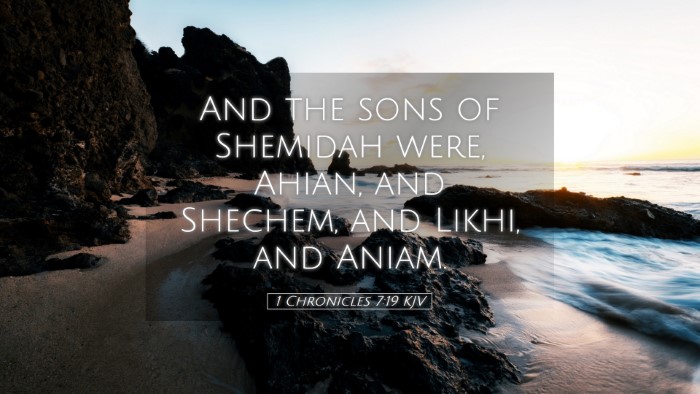Commentary on 1 Chronicles 7:19
Verse Reference: 1 Chronicles 7:19 states, "The sons of Ephraim: Shuthelah, and Bered his son, and Tahath his son, and Eleadah his son, and Tahath his son." This verse falls within a genealogical context, which often highlights significant family lines and their contributions.
Historical Context
This verse is situated in the genealogies recorded in 1 Chronicles, which primarily aim to uphold the covenantal promises of God to Israel. The Chronicler meticulously documents the lineage of the tribes, illustrating the importance of heritage and maintaining the identity of God's chosen people.
Insights from Commentaries
Matthew Henry's Commentary
Henry emphasizes that genealogies serve a divine purpose. They not only establish rightful claims to inheritance but also remind the faithful of God's faithfulness across generations. In this instance, the mention of Ephraim's descendants underscores the significant role of Ephraim in the history of Israel. Henry points out that despite the brevity of this verse, it encapsulates the essence of God's covenant with Abraham, Isaac, and Jacob, and how it extends through their descendants.
Albert Barnes' Notes on the Bible
Barnes provides a detailed exposition regarding Ephraim's descendants. He explains that Shuthelah, Bered, and others mentioned were not just names but figures representing the fulfillment of God's promises. According to Barnes, the presence of multiple sons reflects the blessings promised to Ephraim, showcasing fertility and multiplication as a sign of divine favor. He stresses the importance of recognizing the broader narrative of Israel's history, of which these individuals are a vital part.
Adam Clarke's Commentary
Clarke offers a more critical examination of the names listed. He reflects on the etymology and meanings behind the names, such as "Shuthelah," which he interprets as signifying "he has brought in." This suggests an active divine involvement in the affairs of this lineage. Clarke also delves into the importance of remembering these genealogies, as they provide context and a sense of belonging for contemporary readers. He indicates that understanding one’s heritage and the faithfulness of God in preserving these lines can be a source of great encouragement and strength for believers today.
Theological Implications
This verse, while seemingly simple and genealogical in nature, carries profound theological undertones. It serves as a reminder of God's enduring faithfulness. Each name encapsulated within these verses conveys the truth that God is a God of covenant, who works through families and generations.
- Covenant Faithfulness: The genealogies reaffirm God's promises made to the patriarchs and the unfolding of His plan through their descendants.
- Identity and Heritage: Identity plays a critical role in the life of a believer. This verse invites individuals to recognize their place in the family of God and the historical consequences of faith.
- Divine Providence: By tracing ancestry, the Chronicler underscores not just individual lives but the broader narrative of God's providential care over His people.
Practical Applications for Pastors and Students
This verse encourages pastors and students to embrace the significance of lineage in biblical narratives. It challenges contemporary believers to appreciate their spiritual heritage and recognize their position within God’s eternal family.
- Teaching on Legacy: Pastors can utilize passages like this to address the importance of spiritual legacy, encouraging congregants to invest in their families and communities.
- Genealogy in Faith: Students of scripture are invited to explore genealogies not just as lists of names but as profound theological statements regarding God's character and His engagement with humanity.
- Encouragement in Trials: In moments of doubt or struggle, reflecting on divine faithfulness exhibited through genealogies can provide comfort and boost faith.
Conclusion
While 1 Chronicles 7:19 may appear to present a mere list of names, it serves as a vital link in understanding God's covenant relationship with His people. The insights from respected commentaries deepen our appreciation for the text and encourage us to reflect on the broader implications of God's promise and faithfulness throughout generations. In the life of every believer, the acknowledgment of one's spiritual ancestry provides not only identity but also the assurance that God's plan continues through the ages.


